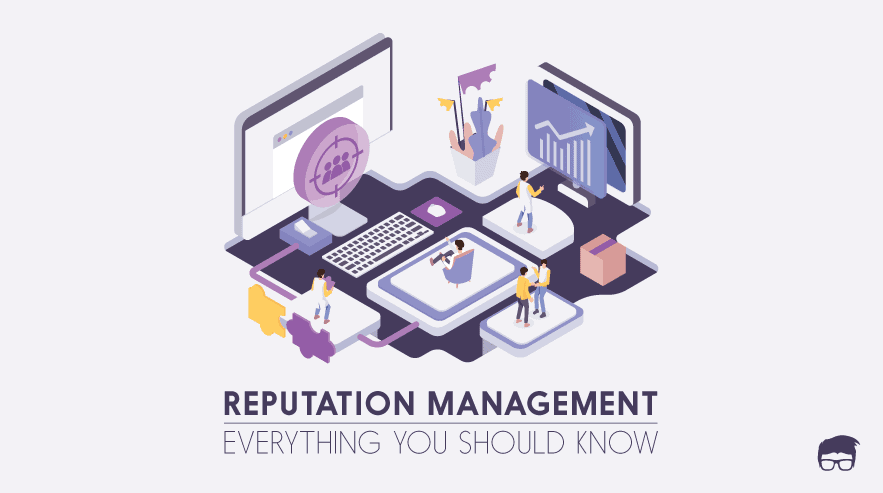91% of consumers within the age of 18-34 trust online reviews as much as personal recommendations. Therefore, shaping public perception of an organization is highly influenced by the information posted online. And that is what reputation management (rep management, online reputation management, ORM) is concerned with.
Without a good reputation, success is limited, and a company’s long-term future is not guaranteed. Reputation management focuses on managing the organization’s information and reviews within the digital world due to the growing influence of the internet and social media today.
Who Is A Reputation Manager?
Reputation managers are PR specialists who monitor and control online activities of an organization’s brands and sub-brands. They make sure that favourable reviews stand above unfavourable ones. In simple terms, reputation managers safeguard a brand’s reputation on the internet by controlling online information, both good and bad.
In addition to building a consistent reputation across all web-based channels and platforms, a reputation manager’s job includes traditional public relations strategies as well. Search engine management is also a key responsibility of ORM so as to counter negative search results.
Read on to find out what employers expect from a reputation manager.
Online Reputation Manager (ORM) Job Description
The utmost role and responsibility of a reputation manager is to create and maintain a favourable brand image of the company and its products. He is in charge of every social media account of the company’s brands and monitors how the brands are engaging with the audience. Not just this, ORM also handles what should go out in media about the company and how to handle negative publicity even on the review websites like Glassdoor, Yelp, Google Play, iTunes etc.
Put Forth Company’s Best Image
A company’s reputation depends on the way its customers, employees and investors view it. One tweet, one Facebook post, and even one review can influence these factors for better or worse. ORM should put forth an image which conveys the message that the company values customer responses.
This is achieved by always making sure you reply to the reviews, queries or complaints that the customer may have.
Build Trust And Brand Loyalty
Customers are sure to research about a company before making a purchasing decision and your lack of response to negative comments or reviews can make them hesitant. A reputation manager has to deal with such problems and help neutralize any bad review or comments.
Showing your customers that you will improve or act upon the problems is a great way to boost your reputation. When your business understands and adopts the needs of a customer, they feel that they are an important component of your business. This can help build brand loyalty and ultimately raise revenues.
Manage During A Scrutiny
A reputation manager has to help cope with scrutiny by business communities, regulators and corporate governance teams. This can be done by implementing good reputation management practices.
The internet is a difficult place to survive the competition. Any person wanting to damage a company’s reputation will find very few obstacles in their way. A management team dedicated to minimizing damage in case of any future crisis is thus vital to every company in the long run. That is why a reputation manager is essential for any company.
If you think you have the skills to handle the responsibilities mentioned in the job description above, you can now read on to find out what educational qualifications you might require.
Expectations From A Reputation Manager
A reputation manager is expected to:
- Have an understanding of search engine behaviour, social media, forums, blogs, ratings and reviews, etc. These are considered to be the most important and basic skills of a reputation manager.
- Work towards enhancing and building the organization’s reputation by constantly measuring the effectiveness of your strategies.
- Establish policies and procedures, systems and standards that will avoid any negative impacts on the organization. Reaching out to dissatisfied customers is an important procedure to control negative reviews. Moreover, focussing on forums, tweets, images, and writing effective blog posts, or publishing positive reviews is also the responsibility of a reputation manager.
- Be well prepared for taking immediate action when the company’s reputation has been tarnished.
- Research online to find out all the negative keywords associated with a brand or individual and publish positive content that can then neutralize the effect of the former.
- Lead the management team in maintaining and improving the company’s reputation.
- Handle difficult situations such as internet blackmail and ethical manipulation of search engine results or reviews.
Educational Requirements And Skills For A Reputation Manager
As the job of a reputation manager largely surrounds the digital world, having a degree in digital marketing, social media marketing/branding or industrial relations is recommended. Qualifications like a Bachelors or Masters in Business Management or Mass Communication can ensure a bright future in the field.
Additional tools like SEO and knowledge in programming will be an added advantage.
Reputation Manager Salary
In the United States, the average salary of a reputation manager is considered to be $62,846 per year. The salary can range from $37k to $101k depending on your experience, skills and expertise levels.
Complete and effective management of a company’s reputation requires the presence of a skilled reputation manager. Building a reputation, sustaining a reputation, and protecting a reputation are each different objectives and each of these require different strategies and skills. This is all the more of a reason to have an individual or group of individuals to work exclusively for reputation management.
Go On, Tell Us What You Think!
Did we miss something? Come on! Tell us what you think about our article on online reputation manager job description in the comments section.
Started off as a pilot but took the road of entrepreneurship. Ask me anything about the changing trends and the startup ecosystem.









